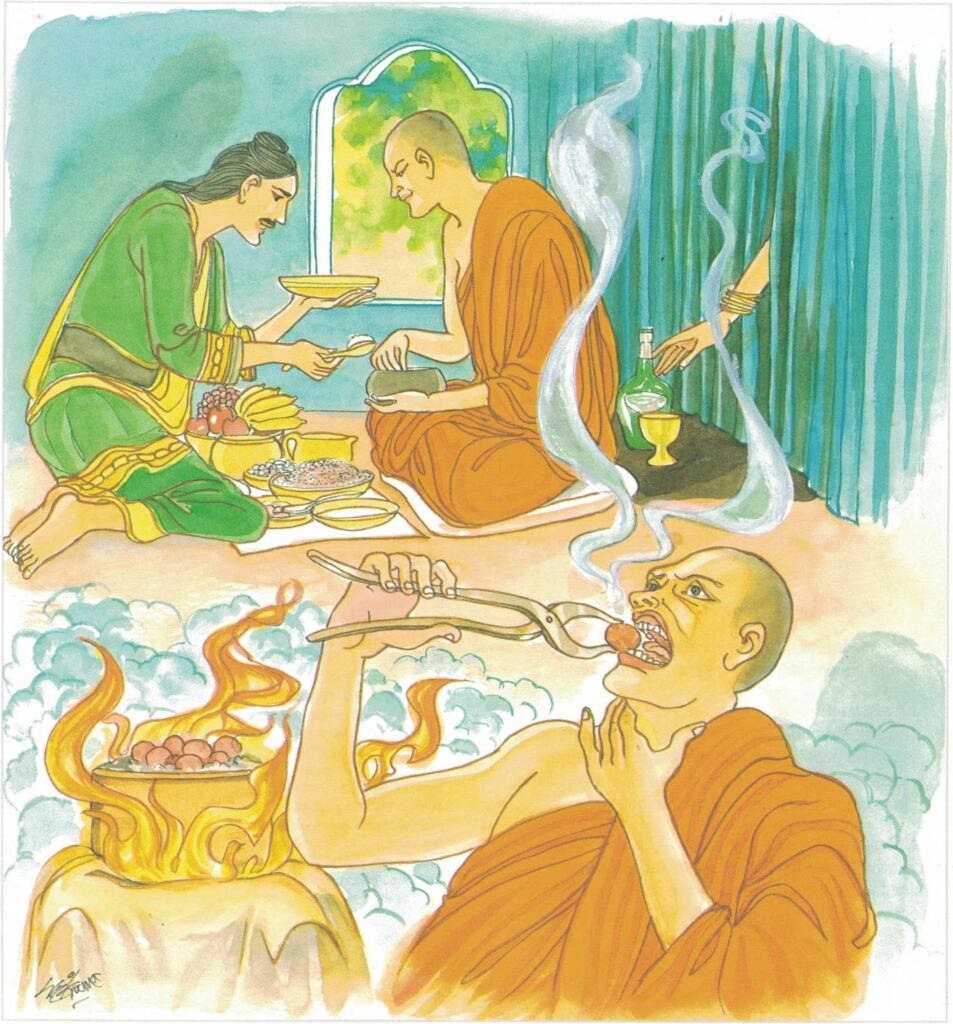Pali text, illustration and English translation of Dhammapada verse 308:
seyye ayoguḷo bhutto tatto aggisikhū’pamo |
yañce bhūñjeyya dussīlo raṭṭhapiṇḍaṃ asaññato || 308 ||
308. Better to eat a ball of iron glowing as flame of fire than one should eat the country’s alms immoral and unrestrained.

The Monks Who Lived on the Bank of the Vaggumudā River
While residing at the Mahāvana forest near Vesāli, the Buddha spoke this verse with reference to the monks who spent the rainy season on the bank of the Vaggumudā River.
At that time, there was a famine in the country of the Vajjis. So, to enable them to have enough food, those monks made it appear to the people that they had attained magga and phala although they had not done so. The people from the village, believing them and respecting them, offered much food to them leaving very little for themselves.
At the end of the rainy season (vassa), as was customary, monks from all parts of the country came to pay homage to the Buddha. The monks from the bank of the Vaggumudā River also came. They looked hale and hearty while the other monks looked pale and worn out. The Buddha talked to all the monks and enquired how they fared during the vassa. To the monks from Vaggumudā River the Buddha specifically asked whether they had any difficulty in getting alms-food on account of the famine. They answered that they had no difficulty at all in getting alms-food.
The Buddha knew how those monks had managed to get enough alms-food. But he wanted to teach them on this point, so he asked, “How did you manage so well in getting alms-food throughout the rainy season?” Then the monks told him how they discussed among themselves and decided that they should address one another in such a way that the villagers would think that they had really attained jhāna, magga and phala. Then the Buddha asked them whether they had really attained jhāna, magga and phala. When they answered in the negative, the Buddha reprimanded them and recited this stanza.
Explanatory Translation (Verse 308)
asaññato dussīlo ce yañ raṭṭhapiṇḍaṃ bhuñjeyya,
tattho aggisikhūpamo, ayoguḷo bhutto seyyo
asaññato [asaññata]: undisciplined; dussīlo [dussīla]: lacking in virtue; ce: if; yañ: for some reason; raṭṭhapiṇḍaṃ [raṭṭhapiṇḍa]: food given by the people; bhuñjeyya: were to eat; tattho [tattha]: heated; aggisikhūpamo [aggisikhūpama]: flame like;ayoguḷo [ayoguḷa]: iron ball; bhutto [bhutta]: eating; seyyo [seyya]: is better
It is better for one to eat a red-hot lump of iron burning like a flame than to eat alms-food offered by the people, if one is without morality (sīla) and unrestrained in thought, word and deed.
Commentary and exegetical material (Verse 308)
vassa: This verse was spoken by the Buddha with reference to a group of monks who spent the vassa (the rainy season) on the bank of the Vaggumudā River.
In ancient times, as today, three regular seasons prevailed in India, namely, vassāna (rainy) hemanta (winter) and gimhāna (hot). The vassāna or rainy season starts in Asātha and extends up to Assayuga, that is approximately from the middle of July to the middle of November.
During the vassāna period, due to torrential rains, rivers and streams usually get flooded, roads get inundated, communications get interrupted and people as a rule are confined to their homes and villages and live on what provisions they have collected during the previous seasons. During this time the ascetics find it difficult to engage in their preaching tours, wandering from place to place. An infinite variety of vegetable and animal life also appears to such an extent that people could not move about without unconsciously destroying them. Accordingly, all ascetics including the disciples of the Buddha, used to suspend their itinerant activities and live in retirement in solitary places. As a rule the Buddha and His disciples were invited to spend their rainy seasons either in a monastery or in a secluded park. Sometimes, however, they used to retire to forests. During these rainy seasons people flocked to the Buddha to hear the Dhamma and thus availed themselves of His presence in their vicinity to their best advantage.